#arrian
Photo

Periplus of the Euxine Sea
The Periplus of the Euxine Sea (Circumnavigation of the Black Sea) is a description of trade routes along the shores of the Black Sea written by Arrian of Nicomedia (Lucius Flavius Arrianus), a historian and philosopher writing in the early 2nd century CE. This geographical treatise provides valuable insights into the geography, culture, and commerce of the Black Sea region, known as the Euxine Sea in antiquity, with notices of rivers, harbours, and tribes under the supervision of client kings.
Continue reading...
111 notes
·
View notes
Text

It's a work in progress, since the RP is still going on.
And it needs some knowledge about how Saqqara got into Fabius' hands, who those people of the Consortium and in Erebus' inner circle and those pesky Harlequins and beautiful Noise Marines are. But if you've read "Shards of Erebus" and the first Fabius-novel you are fine.
#warhammer#emperor's children#Word Bearers#Fabius Bile#Erebus#The Consortium#Chaos Space Marines#Fanart for Fanfiction#A03#Roleplay#Saqqara#Arrian#Ramos#Kolos Undil#Harlequins#Veilwalker just appeared
46 notes
·
View notes
Note
I enjoy giving the boops
Average boop-reaction:
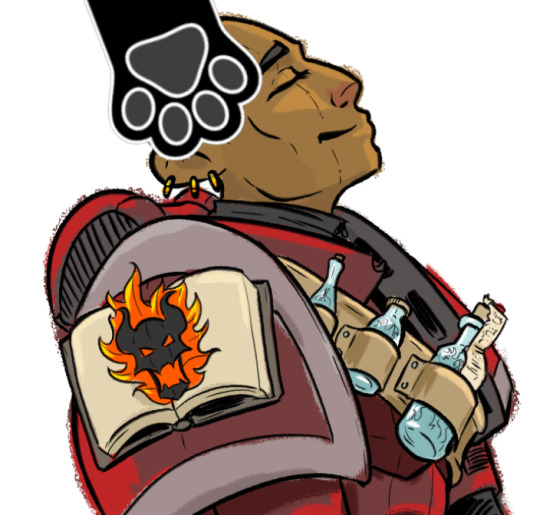

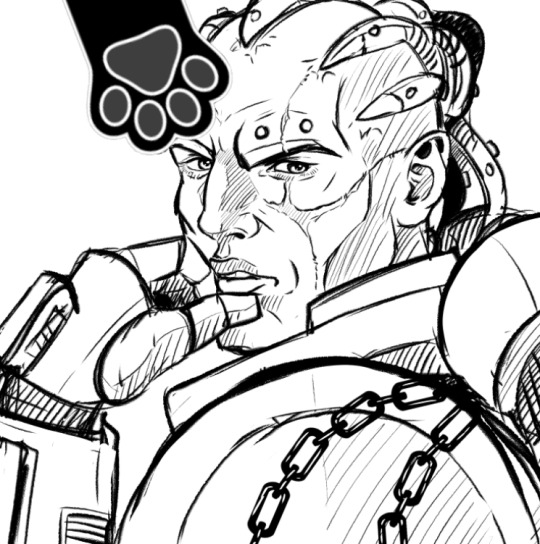

23 notes
·
View notes
Note
I see you talk a lot about historiography! What would you consider the most important development of Alexander’s historiography?
What the Hell is Historiography? (And why you should care)
This question and the next one in the queue are both going to be fun for me. 😊
First, some quick definitions for those who are new to me and/or new to reading history:
Historiography = “the history of the histories” (E.g., examination of the sources themselves rather than the subject of them…a topic that typically incites yawns among undergrads but really fires up the rest of us, ha.)
primary sources = the evidence itself—can be texts, art, records, or material evidence. For ancient history, this specifically means the evidence from the time being studied.
secondary sources = writings by historians using the primary evidence, whether meant for a “regular” audience (non-specialists) or academic discussions with citations, footnotes, and bibliography (sometimes referred to as “full scholarly apparatus”).
For ancient history, we also sometimes get a weird middle category…they’re not modern sources but also not from the time under discussion, might even be from centuries after the fact. Consider the medieval Byzantine “encyclopedia” called the Suda (sometimes Suidas), which contains information from now lost ancient sources, finalized c. 900s CE. To give a comparison, imagine some historian a thousand years from now studying Geoffry Chaucer from the 1300s, using an entry about him in some kid’s 1975 World Book Encyclopedia that contains information that had been lost by his day.
This middle category is especially important for Alexander, since even our primary sources all date hundreds of years after his death. Yes, those writers had access to contemporary accounts, but they didn’t just “cut-and-paste.” They editorialized and selected from an array of accounts. Worse, they rarely tell us who they used. FIVE surviving primary Alexander histories remain, but he’s mentioned in a wide (and I do mean wide) array of other surviving texts. Alas this represents maybe a quarter of what was actually written about him in antiquity.
OKAY, so …
The most important historiographic changes in Alexander studies!
I’m going to pick three, or really two-and-a-half, as the last is an extension of the second.
FIRST …decentering Arrian as the “good” source as opposed to the so-called “vulgate” of Diodoros-Curtius-Justin as “bad” sources.
Many earlier Alexander historians (with a few important exceptions [Fritz Schachermeyr]) considered Arrian to be trustworthy, Plutarch moderately trustworthy if short, and the rest varying degrees of junk. W. W. Tarn was especially guilty of this. The prevalence of his view over Schachermeyr’s more negative one owed to his popularity/ease of reading, and the fact he wrote on Alexander for volume 6 of the first edition (1927) of the Cambridge Ancient History, later republished in two volumes with additions (largely in vol. 2) in 1948 and 1956. Thus, and despite being a lawyer (barrister) not a professional historian, his view dominated Alexander studies in the first half of the 20th century (Burn, Rose, etc.)…and even after. Both Mary Renault and Robin Lane Fox (neither of whom were/are professional historians either), as well as N. G. L. Hammond (with qualifications), show Tarn’s more romantic impact well into the middle of the second half of the 20th century. But you could find it in high school and college textbooks into the 1980s.
The first really big shift (especially in English) came with a pair of articles in 1958 by Ernst Badian: “The Eunuch Bagoas,” Classical Quarterly 8, and “Alexander the Great and the Unity of Mankind,” Historia 7. Both demolished Tarn’s historiography. I’ve talked about especially the first before, but it really WAS that monumental, and ushered in a more source-critical approach to Alexander studies. This also happened to coincide with a shift to a more negative portrait of the conqueror in work from the aforementioned Schachermeyr (reissuing his earlier biography in 1973 as Alexander der Grosse: Das Problem seiner Persönlichtenkeit und seines Wirkens) to Peter Green’s original Alexander of Macedon from Thames and Hudson in 1974, reissued in 1991 from Univ. of California-Berkeley. J. R. Hamilton’s 1973 Alexander the Great wasn’t as hostile, but A. B. Bosworth’s 1988 Conquest and Empire: The Reign of Alexander the Great turned back towards a more negative, or at least ambivalent portrait, and his Alexander in the East: The Tragedy of Triumph (1996) was highly critical. I note the latter two as Bosworth wrote the section on Alexander for the much-revised Cambridge Ancient History vol. 6, 1994, which really demonstrates how the narrative on Alexander had changed.
All this led to an unfortunate kick-back among Alexander fans who wanted their hero Alexander. They clung/still cling to Arrian (and Plutarch) as “good,” and the rest as varying degrees of bad. Some prefer Tarn’s view of the mighty conqueror/World unifier/Brotherhood-of-Mankind proponent, including that He Absolutely Could Not Have Been Queer. Conversely, others are all over the romance of him and Hephaistion, or Bagoas (often owing to Renault or Renault-via-Oliver Stone), but still like the squeaky-nice-chivalrous Alexander of Plutarch and Arrian.
They are very much still around. Quite a few of the former group freaked out over the recent Netflix thing, trotting out Plutarch (and Arrian) to Prove He Wasn’t Queer, and dismissing anything in, say, Curtius or Diodoros as “junk” history. But I also run into it on the other side, with those who get really caught up in all the romance and can’t stand the idea of a vicious Alexander.
It's not necessary to agree with Badian’s (or Green’s or Schachermeyr’s) highly negative Alexander to recognize the importance of looking at all the sources more carefully. Justin is unusually problematic, but each of the other four had a method, and a rationale. And weaknesses. Yes, even Arrian. Arrian clearly trusted Ptolemy to a degree Curtius didn’t. For both of them, it centered on the fact he was a king. I’m going to go with Curtius on this one, frankly.
Alexander is one of the most malleable famous figures in history. He’s portrayed more ways than you can shake a stick at—positive, negative, in-between—and used for political and moral messaging from even before his death in Babylon right up to modern Tik-Tok vids.
He might have been annoyed that Julius Caesar is better known than he is, in the West, but hands-down, he’s better known worldwide thanks to the Alexander Romance in its many permutations. And he, more than Caesar, gets replicated in other semi-mythical heroes. (Arthur, anybody?)
Alfred Heuss referred to him as a wineskin (or bottle)—schlauch, in German—into which subsequent generations poured their own ideas. (“Alexander der Große und die politische Ideologie des Altertums,” Antike und Abendland 4, 1954.) If that might be overstating it a bit, he’s not wrong.
Who Alexander was thus depends heavily on who was (and is) writing about him.
And that’s why nuanced historiography with regard to the Alexander sources is so important. It’s also why there will never be a pop presentation that doesn’t infuriate at least a portion of his fanbase. That fanbase can’t agree on who he was because the sources that tell them about him couldn’t agree either.
SECOND …scholarship has moved away from an attempt to find the “real” Alexander towards understanding the stories inside our surviving histories and their themes. A biography of Alexander is next to impossible (although it doesn’t stop most of us from trying, ha). It’s more like a “search” for Alexander, and any decent history of his career will begin with the sources. And their problems.
This also extends to events. I find myself falling in the middle between some of my colleagues who genuinely believe we can get back to “what happened,” and those who sorta throw up their hands and settle on “what story the sources are telling us, and why.” Classic Libra. 😉
As frustrating as it may sound, I’m afraid “it depends” is the order of the day, or of the instance, at least. Some things are easier to get back to than others, and we must be ready to acknowledge that even things reported in several sources may not have happened at all. Or at least, were quite radically different from how it was later reported. (Thinking of proskynesis here.) Sometimes our sources are simply irreconcilable…and we should let them be. (Thinking of the Battle of Granikos here.)
THIRD/SECOND-AND-A-HALF …a growing awareness of just how much Roman-era attitudes overlay and muddy our sources, even those writing in Greek. It would be SO nice to have just one Hellenistic-era history. I’d even take Kleitarchos! But I’d love Marsyas, or Ptolemy. Why? Both were Macedonians. Even our surviving philhellenic authors such as Plutarch impose Greek readings and morals on Macedonian society.
So, let’s add Roman views on top of Greek views on top of Macedonian realities in a period of extremely fast mutation (Philip and Alexander both). What a muddle! In fact, one of the real advantages of a source such as Curtius is that his sources seem to have known a thing or three about both Achaemenid Persia and also Macedonian custom. He sometimes says something like, “Macedonian custom was….” We don’t know if he’s right, but it’s not something we find much in other histories—even Arrian who used Ptolemy. (Curtius may also have used Ptolemy, btw.)
In any case, as a result of more care given to the themes of the historians, a growing sensitivity to Roman milieu for all of them has altered our perceptions of our sources.
These are, to me, the major and most significant shifts in Alexander historiography from the late 1800s to the early 2100s.
#asks#historiography#alexander the great#arrian#curtius#plutarch#diodorus#justin#w.w. tarn#fritz schachermeyr#a.b. bosworth#peter green#n.g.l. hammond#mary renault#robin lane fox#j.r. hamilton#ernst badian#classics#ancient history#ancient macedonia
23 notes
·
View notes
Text
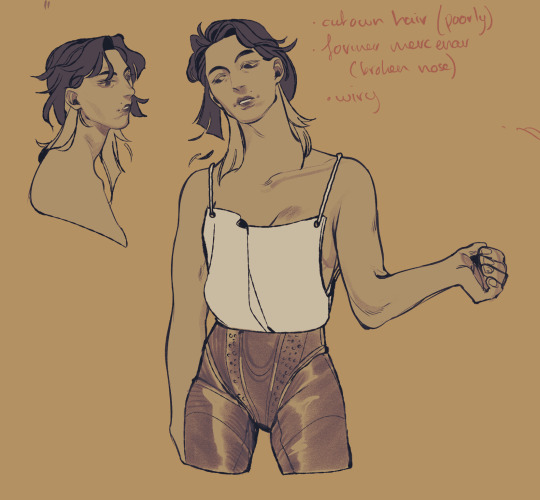
first pass at Arrian 🤔 she loves money and fancy shit but never seems to have any (on account of the gambling) & is one of the protags of a self indulgent thing I’m writing 🤲
763 notes
·
View notes
Text
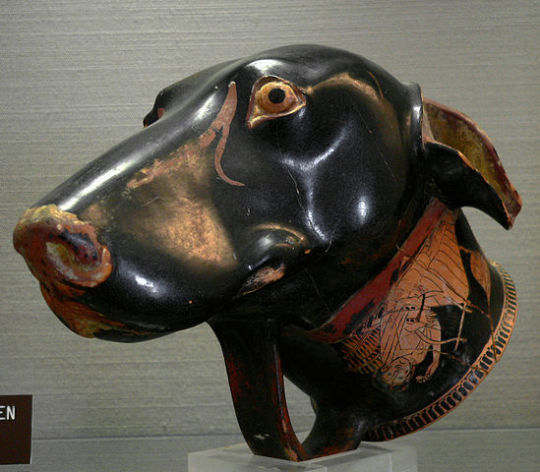
Some Pet Dog Names from Ancient Greece
When the hound has caught the hare, or been otherwise victorious in the course, you should […] pat him with your hand and praise him, kissing his head, and stroking his ears, and speaking to him by name […] for, like men of generous spirit, they love to be praised; and the dog, if not quite tired out [from the hunt] will come up with joy to caress you. (Arrian, On Coursing, XVIII Pg 116 trans. William Dansey)
As many dogs were hunting hounds or guard dogs in Ancient Greece, it followed that the naming convention was dependant on psychology; to name the dog something strong or skilful was to boast of the animals’ superiority to others of its breed, just as it reflected on the owner. There are some well known dogs in Ancient Greek history that many are aware of, namely Cerberus, Odysseus’ faithful dog Argos, and Alexander the Great named a city after his dog Peritas. We are lucky to have two lists of excellent dog names from authors Xenophon and Ovid.
From Xenophon (~ 430 - 355 BC), in his treaties on Hunting, we have the below list:
Give the hounds short names, so as to be able to call to them easily. The following are the right sort: Psyche, Thymus, Porpax, Styrax, Lonchê (Lance), Lochus, Phrura, Phylax (Sentinel/Guardian), Taxis, Xiphon, Phonax, Phlegon, Alcê (Stout), Teuchon, Hyleus, Medas (Crafty), Porthon, Sperchon (Bustler/Hasty), Orgê, Bremon, Hybris, Thallon (Vigorous), Rhomê, Antheus (Blossom), Hebe, Getheus, Chara (Jolly/Ecstasy), Leusson, Augo (Bright), Polys, Bia, Stichon, Spudê, Bryas, Oenas (Blueskin), Sterrus, Craugê, Caenon, Tyrbas, Sthenon, Aether, Actis, Aechmê, Noes (Counsellor), Gnomê, Stibon, Hormê (Impetus). (Xenophon Kynegetikos On Hunting 7.5)
A kind person on Reddit suggested these names could also translate as:
Psyche = Psyche / Spirit
Thymus = Pluck
Porpax = Buckler
Styrax = Spigot
Lonche = Lance
Lochus = Lurcher
Phrura = Watch
Phylax = Keeper
Taxis = Brigade
Xiphon = Fencer
Phonax = Butcher
Phlegon = Blazer
Alce = Prowess
Teuchon = Craftsman
Hyleus = Foster
Medas = Counsellor
Porthon = Spoiler
Sperchon = Hurry
Orge = Fury
Bremon = Growler
Hybris = Riot / Insolence
Thallon = Bloomer
Rhome = Rome / Mighty
Antheus = Blossom
Hebe = Hebe / Youth (Young’n)
Getheus = Hilary / Happy
Chara = Jollity
Leusson = Glazer
Augo = Eyesbright
Polys = Much
Bia = Force
Stichon = Trooper
Spude = Bustle
Bryas = Bubbler
Oenas = Rockdove
Sterrus = Stubborn
Crauge = Yelp
Caenon = Killer
Tyrbas = Strongboy / Riot
Sthenon = Sky
Aether = Sunbeam
Actis = Bodkin
Aechme = Wistful
Noes = Gnome
And from Ovid (~ 43 BC - 17 AD), in his Metamorphosis, of the dogs that attacked their master Actaeon, we have:
First ‘Black-foot’, Melampus, and keen-scented Ichnobates, ‘Tracker’, signal him with baying, Ichnobates out of Crete, Melampus, Sparta. Then others rush at him swift as the wind, ‘Greedy’, Pamphagus, Dorceus, ‘Gazelle’, Oribasos, ‘Mountaineer’, all out of Arcadia: powerful ‘Deerslayer’, Nebrophonos, savage Theron, ‘Whirlwind’, and Laelape, ‘Hunter’. Then swift-footed Pterelas, ‘Wings’, and trail-scenting Agre, ‘Chaser’, fierce Hylaeus, ‘Woody’, lately gored by a boar, the wolf-born Nape, ‘Valley’, Poemenis, the trusty ‘Shepherd’, and Harpyia, ‘Snatcher’, with her two pups. There is thin-flanked Sicyonian Ladon, ‘Catcher’, Dromas, ‘Runner’, ‘Grinder’, Canache, Sticte ‘Spot’, Tigris ‘Tigress’, Alce, ‘Strong’, and white-haired Leucon, ‘Whitey’, and black-haired Asbolus, ‘Soot’. Lacon, ‘Spartan’, follows them, a dog well known for his strength, and strong-running Aëllo, ‘Storm’. Then Thoos, ‘Swift’, and speedy Lycisce, ‘Wolf’, with her brother Cyprius ‘Cyprian’. Next ‘Grasper’, Harpalos, with a distinguishing mark of white, in the centre of his black forehead, ‘Black’, Melaneus, and Lachne, ‘Shaggy’, with hairy pelt, Labros, ‘Fury’, and Argiodus, ‘White-tooth’, born of a Cretan sire and Spartan dam, keen-voiced Hylactor, ‘Barker’ […] First ‘Black-hair’, Melanchaetes, wounds his back, then ‘Killer’, Theridamas, and Oresitrophos, the ‘Climber’, clings to his shoulder. (Ovid Metamorphoses III 206-233 trans. A S Kline)
Theoi has Brookes More’s translation which offers a few English variations on the names.
A few fun ideas to keep in mind if looking to name a new pet in Ancient Greek style.
For I have myself bred up a hound whose eyes are the greyest of grey; a swift, hard-working, courageous, sound-footed dog[…]. He is most gentle, and kindly-affectioned […] as soon as he catches sight of me, showing symptoms of joy, and again trotting on before me. […] He is the constant companion of whichever may be sick; and if he has not seen either of us for only a short time, he jumps up repeatedly by way of salutation, and barks with joy as a greeting. (Arrian, On Coursing, V Pg 78-80 trans. William Dansey)
🐶 Sources
Xenophon Kynegetikos
Arrian On Coursing
Ovid Metamorphoses III
Dog shaped Rhyton by the Brygos Painter in Aleria
64 notes
·
View notes
Text
reading arrian’s history of alexander and

arrian just fully giving up at this point

get his ass
#alexander the great#alexander x hephaestion#the iliad#arrian#alexander of macedon#alexander iii of macedon#hephaestion#ancient history#ancient historians#queer history#bisexual#asexual
7 notes
·
View notes
Text
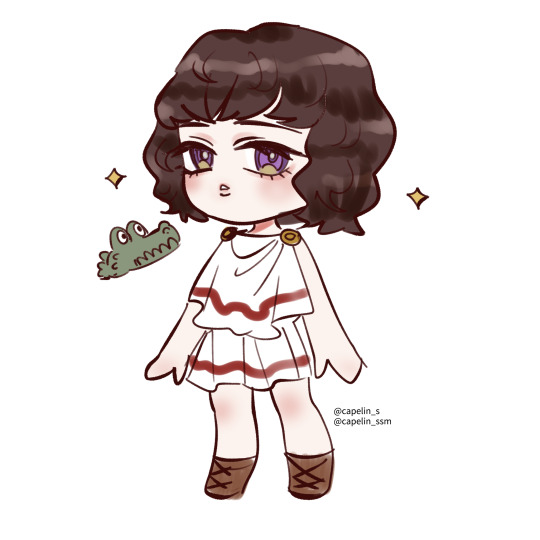
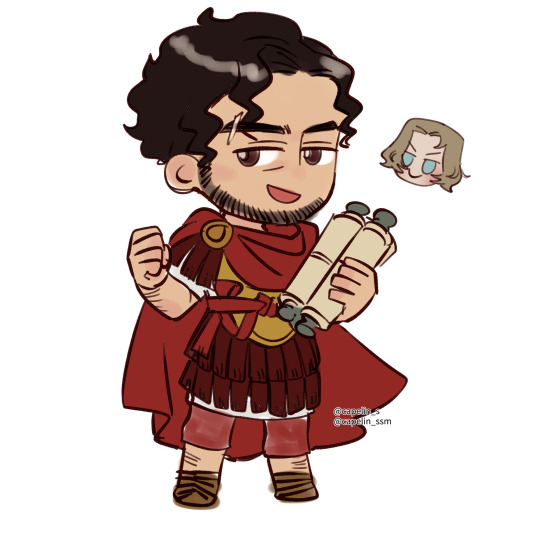
Chibi Antinous and Arrian!
I love Memoirs of Hadrian by Marguerite Yourcenar. Arrian in this novel is very intelligent and gentlemanly.
26 notes
·
View notes
Quote
If you want to do something, make a habit of doing it; and if you don't want to do something, don't do it, but get into the habit of doing something else instead. The same also applies to states of mind.
from Discourses by Epictetus
#discourses#epictetus#arrian#stoic#stoicism#philosophy#habit#habitual#routine#ritual#habits#routines#rituals
336 notes
·
View notes
Photo

Arrian's new, modern look (and her wings can be any shape and pattern she likes)
3 notes
·
View notes
Photo
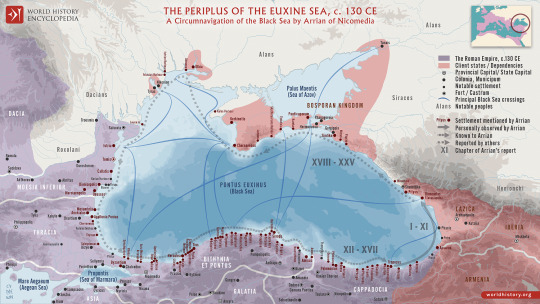
Periplo del Ponto Euxino
El Periplo del Ponto Euxino, la circunnavegación del mar Negro, escrito a principios del siglo II d.C. por Lucio Flavio Arriano. Conocido como Arriano de Nicomedia, el historiador y filósofo describe las rutas de los navíos mercantes que navegaban por las costas del mar conocido en la Antigüedad como Pontus Euxinos. Este tratado geográfico provee un valioso examen del paisaje, la cultura y el comercio en la región del mar Negro, e incluye información sobre los ríos, los puertos y las tribus controladas por reyes ligados a Roma.
Sigue leyendo...
1 note
·
View note
Photo

Périple du Pont-Euxin
Le Périple du Pont-Euxin (Circumnavigation de la mer Noire) est une description des routes commerciales le long des rives de la mer Noire écrite par Arrien de Nicomédie (Lucius Flavius Arrianus), un historien et philosophe écrivant au début du IIe siècle de notre ère. Ce traité géographique fournit des informations précieuses sur la géographie, la culture et le commerce de la région de la mer Noire, connue sous le nom Pont-Euxin dans l'Antiquité, avec des notices sur les rivières, les ports et les tribus sous la supervision de rois clients.
Lire la suite...
1 note
·
View note
Text

I just learned that today is
NATIONAL CINNAMON BUN DAY
in Sweden.
So have the two biggest cinnamon buns in all of 40k - Saqqara and Arrian.
27 notes
·
View notes
Note
Duco should be kissed on the forehead and told that he's loved and valued.

Actual photo of Duco getting manhandled by Arrian.
See, holding and kissing him is not a good idea. (Arrian wasn't planning on kissing him, that's for sure!)
31 notes
·
View notes
Text
The second of two Tiktok posts wherein I discuss the ancient sources on Alexander the Great. In this one, I discuss the extant (still existing) sources, the biographies/histories and a few other places we find him such as Polyaenus, Athenaeus, Plutarch's Moralia essays.
#alexander the great#sources on alexander the great#classics#ancient history#ancient greece#ancient macedonia#ancient roman empire#historiography#tagamemnon#Diodorus#Arrian#Plutarch#Curtius Rufus#Justin#Polyaenus#Athenaeus#Jeanne Reames
8 notes
·
View notes
Text
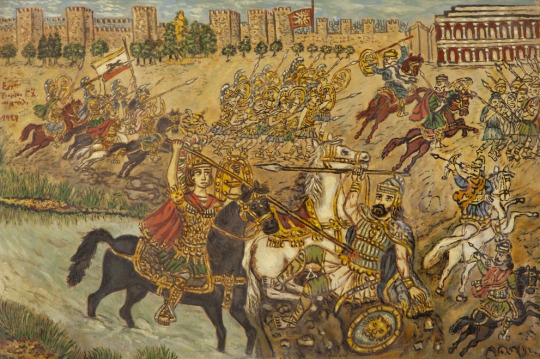
The Battle of Alexander the Great with Mithridates by Theofilos Hadjimichail (1927)
Then indeed, Alexander’s spear being broken to shivers in the conflict, he asked Aretis, one of the royal guards, whose duty it was to assist the king to mount his horse, for another spear. But this man’s spear had also been shivered whilst he was in the thickest of the struggle, and he was conspicuous fighting with the half of his broken spear. Showing this to Alexander, he bade him ask some one else for one. Then Demaratus, a man of Corinth, one of his personal Companions, gave him his own spear; which he had no sooner taken than seeing Mithridates, the son-in-law of Darius, riding far in front of the others, and leading with him a body of cavalry arranged like a wedge, he rode on in front of the others, and hitting at the face of Mithridates with his spear, struck him to the ground.
—Arrian, The Anabasis of Alexander: Chapter XV: Description of the Battle of Granicus
0 notes